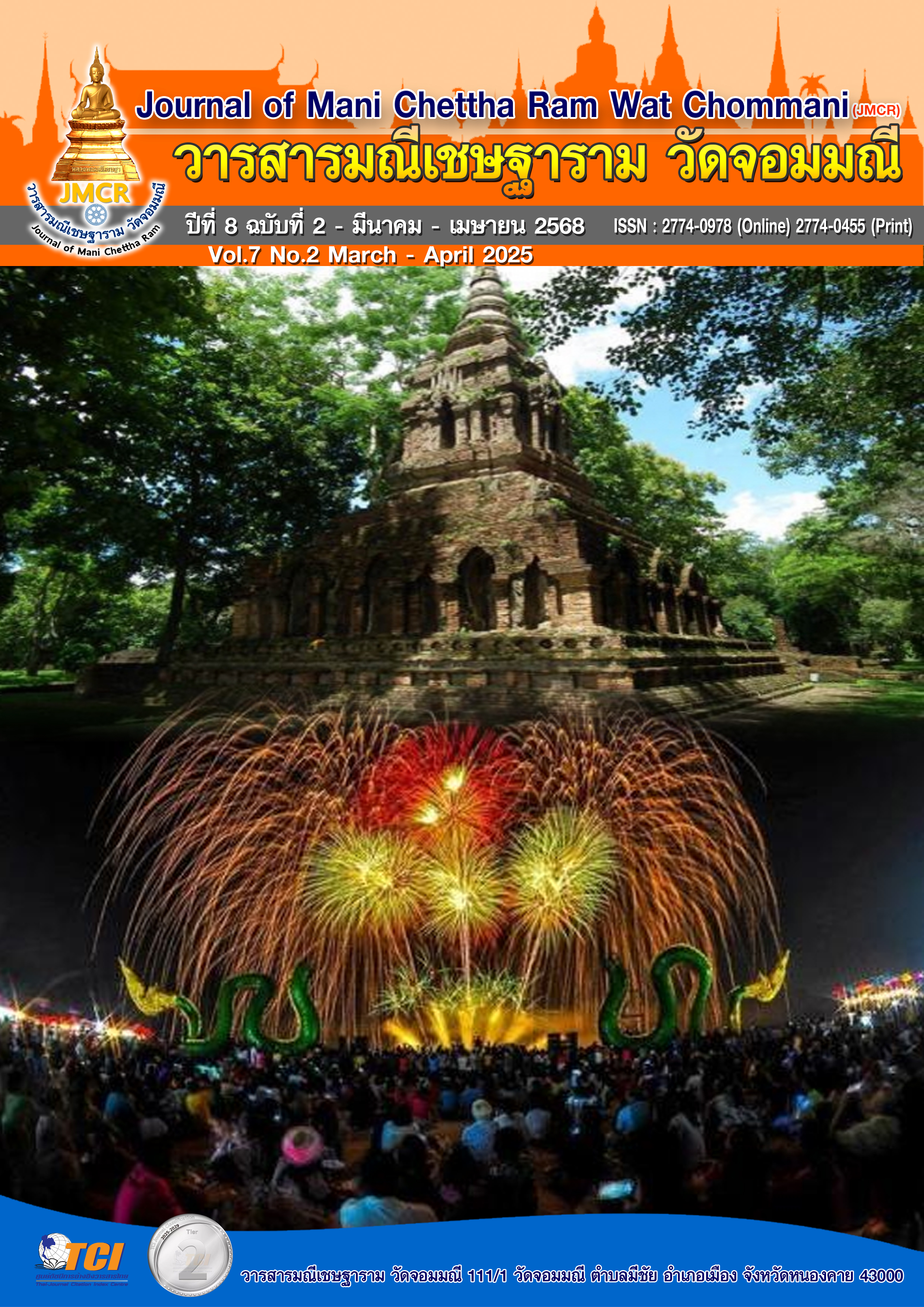DEVELOPMENT OF PROFESSIONAL LEARNING COMMUNITIES IN EDUCATIONAL INSTITUTIONS UNDER THE OFFICE OF THE PRIMARY EDUCATIONAL SERVICE AREA 2, NONG BUA LAMPHU
Keywords:
Development, professional learning communitiesAbstract
This research aimed to 1) study the level of professional learning community development in educational institutions under the Office of the Primary Educational Service Area 2, Nong Bua Lamphu, 2) study the comparison of professional learning community development in educational institutions under the Office of the Primary Educational Service Area 2, Nong Bua Lamphu, classified by gender, education level, position, and work experience, and 3) study the guidelines for professional learning community development in educational institutions under the Office of the Primary Educational Service Area 2, Nong Bua Lamphu. The sample group used in this research was school administrators and teachers in schools using the ready-made table of Krejcie & Morgan, totaling 285 people. The instrument used for data collection was a questionnaire consisting of 3 parts. The statistics used for data analysis were descriptive statistics, including numbers, percentages, means, and standard deviations for general data of the sample group. Inferential statistics were T-test and F-test. The reliability of the questionnaire was 0.796.
The research results found that: 1) The development of professional learning communities in educational institutions is at a high level overall. When considering each aspect, it was found that the aspect with the highest average value was learning and professional development, followed by the community of friends, and the aspect with the lowest average value was the community support structure. 2) The results of the comparison of the development of professional learning communities in educational institutions classified by gender, education level, position, and work experience, overall, found that school administrators and teachers with different genders, education levels, positions, and work experience had no different opinions on the development of professional learning communities in educational institutions. 3) Suggestions for the development of professional learning communities in educational institutions include organizing meetings to allow teachers and school personnel to exchange ideas and set a clear vision for the development of professional learning communities.
References
ชนะการ เลี้ยงอำนวย. (2566). แนวทางการพัฒนาชุมชนแห่งการเรียนรู้ทางวิชาชีพของโรงเรียนศรีวิชัยวิทยา สังกัด สำนักงานเขตพื้นที่การศึกษามัธยมศึกษานครปฐม. สาขาวิชาการบริหารการศึกษา มหาวิทยาลัยศิลปากร.
ทิศนา แขมมณี. (2557). ศาสตร์การสอน: องค์ความรู้เพื่อการจัดกระบนการเรียนรู้ที่มีประสิทธิภาพ. (พิมพ์ครั้งที่ 18). กรุงเทพมหานคร: สํานักพิมพ์แห่งจุฬาลงกรณ์.
ปองทิพย์ เทพอารีย์. (2557). การพัฒนารูปแบบชุมชนแห่งการเรียนรู้เชิงวิชาชีพสำหรับครู ประถมศึกษา. ใน ปริญญานิพนธ์ ปร.ด. สาขาวิชาวิจัยและพัฒนาหลักสูตร. กรุงเทพมหานคร: มหาวิทยาลัยศรีนครินทรวิโรฒ.
วิราวรรณ์ เพ็ชรนาวา. (2564). แนวทางการพัฒนาชุมชนแห่งการเรียนรู้ทางวิชาชีพของโรงเรียนมัธยมศึกษาในสหวิทยาเขตวิภาวดี กรุงเทพมหานคร.สาขาวิชาพัฒนศึกษา คณะศึกษาศาสตร์ มหาวิทยาลัยศิลปากร.
วิลาสินี เทพเสนา. (2563). การศึกษาบทบาทของผู้บริหารต่อการส่งเสริมการจัดการชุมชนแห่งการเรียนรู้ทางวิชาชีพ (PLC) ของโรงเรียนสังกัดกรมส่งเสริมการปกครองท้องถิ่นอำเภอเมืองเชียงราย. สาขาวิชาการบริหารการศึกษา มหาวิทยาลัยพะเยา.
เสริมศักดิ์ วิศาลาภรณ์ และคณะ. (2545). รายงานการวิจัยเรื่องเรื่องรูปแบบเครือข่ายการ พัฒนาครูและบุคลากรทางการศึกษาตามพระราชบัญญัติการศึกษาแห่งชาติ พ.ศ. 2542. สำนักงานคณะกรรมการข้าราชการครู. กรุงเทพมหานคร: กระทรวงศึกษาธิการ.
Best, J.W. (1997). Research in Education. 3rd ed. New Jersey : Prentice Hall Inc.
Krejcie, R.V., & D.W. Morgan. (1970). “Determining Sample Size for Research Activities”. Educational and Psychological Measurement. 30(3) : 607 – 610 .
Senge, Peter M. (1990). The Fifth Discipline: The Art and Practice of the Learning Organization. New York: Doubleday Currency.
Sergiovanni, T. (1994). Building Community in Schools. San Francisco, CA : JosseyBass.




